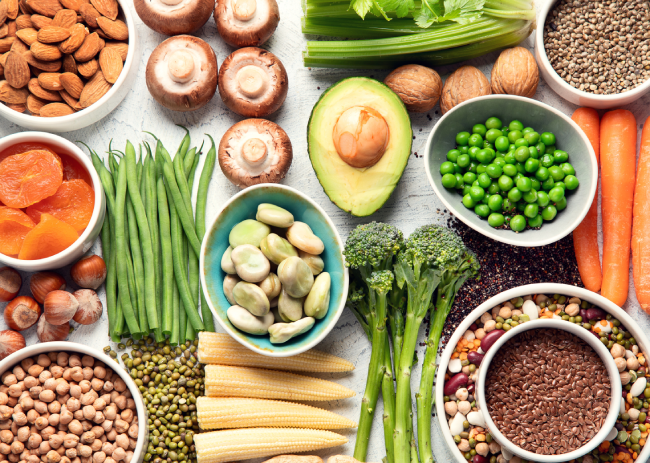Protein is an essential macronutrient for building muscles, repairing tissues, and supporting various body functions. While animal-based proteins have long been the go-to source, plant-based protein options are rising in popularity due to their health benefits and sustainability. Whether you’re following a plant-based diet or simply looking to add variety to your meals, these 10 plant-based protein sources will help you meet your nutritional needs.
1. Lentils: A Protein Powerhouse
Lentils are an incredible source of plant-based protein. A single cup of cooked lentils contains approximately 18 grams of protein. These legumes are also packed with fiber, iron, and folate, which make them great for digestion and maintaining energy levels. In fact, a study published in the American Journal of Clinical Nutrition found that lentil-based diets are not only rich in protein but also support overall health, including cholesterol reduction and heart disease prevention.
Moreover, lentils are versatile. You can use them in soups, salads, or curries. They’re also a great meat substitute in vegan burgers and meatballs. Including lentils in your meals can support both your protein intake and overall health.
2. Chickpeas: Protein-Rich and Versatile
Chickpeas are a great plant-based protein source, offering 15 grams of protein per cooked cup. These legumes are also high in fiber, making them excellent for digestive health. Chickpeas are a great addition to a variety of dishes, from hummus and falafel to stews and curries. A study from the Harvard T.H. Chan School of Public Health found that chickpeas, alongside other legumes, can reduce the risk of chronic diseases, offering a heart-healthy, protein-packed option for your diet.
Their mild flavour makes them incredibly versatile. You can roast them for a crunchy snack or add them to salads for extra protein. Chickpeas offer a low-cost, high-protein option that suits any meal.
3. Tofu: The Ultimate Plant Protein
Tofu is a staple in many plant-based diets. It contains about 20 grams of protein per cup and is an excellent source of calcium and iron. Tofu can be grilled, scrambled, or sautéed, making it one of the most flexible plant protein options. A systematic review published in the Journal of the American Dietetic Association confirmed the health benefits of tofu, citing that it’s a low-calorie, high-protein food with antioxidant and cholesterol-lowering effects.
Whether you prefer the firm or silken variety, tofu can be used in stir-fries, smoothies, or even desserts. Its ability to absorb flavours from other ingredients makes it a perfect addition to your meals.
4. Tempeh: A Fermented Protein Source
Tempeh is made from fermented soybeans, offering about 21 grams of protein per 4-ounce serving. Beyond its protein content, tempeh contains beneficial probiotics that aid in gut health. It is also a good source of magnesium, which supports heart health. According to a study published in the Food Research International journal, the fermentation process in tempeh enhances its nutritional profile, making it a valuable source of bioavailable protein and prebiotics.
This fermented food has a firmer texture and a nutty flavour, making it an excellent substitute for meat in various dishes. You can use tempeh in stir-fries, and sandwiches, or even grill it for a delicious plant-based option.
5. Quinoa: A Complete Plant Protein
Quinoa is unique among plant-based protein sources because it’s a complete protein, meaning it contains all nine essential amino acids. A cup of cooked quinoa provides about 8 grams of protein. Besides being rich in protein, quinoa is a great source of fiber, antioxidants, and minerals such as magnesium.
Quinoa is highly versatile, too. You can use it as a base for salads, stews, or as a side dish to main meals. It’s an excellent addition to your diet for muscle recovery and overall health.
6. Edamame: Protein-Packed Young Soybeans
Edamame, or young soybeans, provide about 17 grams of protein per cup. These bright green soybeans are also packed with antioxidants and nutrients like iron and calcium. Edamame is often enjoyed as a snack or appetizer. A study published in Food Chemistry highlights the nutritional benefits of edamame, showing how it contributes to overall health while supporting antioxidant activity in the body.
You can steam them, toss them in salads, or use them in stir-fries. They’re quick, easy, and perfect for anyone looking to add a protein boost to their meal.
7. Peanuts: Protein and Healthy Fats
Peanuts are rich in plant-based protein, offering about 7 grams per ounce. They also contain healthy fats that contribute to heart health. Beyond their high protein content, peanuts are a good source of B vitamins and minerals like magnesium and potassium.
You can enjoy peanuts as a snack, add peanut butter to smoothies, or mix them into your dishes for added flavour and protein. While they are energy-dense, a small serving is all you need to reap the benefits.
8. Chia Seeds: Tiny But Mighty
Chia seeds are small but packed with protein, offering about 4 grams per two-tablespoon serving. These tiny seeds are packed with omega-3 fatty acids and are also a good source of calcium. They can be added to smoothies, puddings, or incorporated into various recipes for an extra boost of nutrition.
Chia seeds help support digestive health and provide long-lasting energy. They absorb liquid and form a gel-like consistency, making them great for puddings and smoothies. You can even use them in baking for added nutrition.
9. Hemp Seeds: Complete Protein on the Go
Hemp seeds are a complete protein, offering around 10 grams of protein per 3-tablespoon serving. These seeds also provide essential fatty acids like omega-3s and omega-6s, making them excellent for heart health.
Sprinkle hemp seeds onto salads, yoghurt, or cereal. They blend effortlessly into any dish, giving you a nutrient boost without overwhelming the flavours.
10. Seitan: High Protein Meat Alternative
Seitan is a wheat gluten-based protein source that provides about 21 grams of protein per 3-ounce serving. Due to its chewy texture, it’s commonly used as a meat substitute in many plant-based dishes. It’s often found in vegan meat products, from sausages to burgers.
Although it’s low in certain amino acids, seitan can still be a great protein source when paired with other ingredients. It’s especially popular for vegan and vegetarian diets as a savoury alternative to meat.
FAQs about Plant-Based Protein
What is the healthiest plant-based protein?
The healthiest plant-based protein depends on several factors, such as nutritional density and your dietary goals. In general, lentils and quinoa are among the healthiest options due to their balance of protein, fiber, vitamins, and minerals. Lentils offer an excellent source of plant-based protein while also being rich in iron, folate, and antioxidants. On the other hand, quinoa is a complete protein, meaning it contains all nine essential amino acids that the body cannot produce on its own. Both provide multiple health benefits, including supporting digestive health, heart health, and muscle repair, making them excellent additions to your diet.
Which is the highest quality plant protein source?
The highest quality plant protein source is quinoa, as it contains all nine essential amino acids, making it a complete protein. Most plant-based proteins are not complete, meaning they lack one or more of the essential amino acids. However, quinoa stands out because it provides the full spectrum of amino acids needed for tissue repair and optimal health. Soy-based products like tempeh and tofu also rank high in protein quality because they contain all essential amino acids. Including a variety of plant proteins in your diet can help ensure you receive all the amino acids required for optimal body function.
Which plant food has the highest protein?
The plant food with the highest protein content per serving is seitan, offering about 21 grams of protein per 3-ounce serving. Seitan is a high-protein food made from wheat gluten, which makes it a popular meat substitute in plant-based diets. It’s incredibly versatile and can be prepared in many different ways, from vegan sausages to stir-fried dishes. However, while seitan provides the highest protein per serving, it is low in certain amino acids, so it is best paired with other plant-based foods like quinoa or legumes to ensure a complete protein profile. Another high-protein plant food includes lentils, which provide around 18 grams of protein per cooked cup.
What are the disadvantages of plant protein?
While plant protein has many benefits, there are a few potential disadvantages. Incomplete proteins in plant foods may require combining different sources, such as pairing legumes with grains, to get all nine essential amino acids. Some plant proteins, like seitan, lack certain amino acids, so proper food pairing is essential.
Additionally, some people may struggle to consume enough plant-based protein, particularly if they have higher protein needs for muscle growth or recovery. Another downside is that some plant protein sources are high in carbohydrates or contain anti-nutrients (like phytates) that can reduce nutrient absorption. It’s important to plan your meals to ensure you’re meeting your protein needs without consuming too many carbohydrates or missing essential nutrients.
In Conclusion
Incorporating plant-based protein into your diet is a great way to meet your nutritional needs while supporting overall health. With many options ranging from legumes and seeds to tofu and seitan, it’s easier than ever to enjoy a balanced, plant-powered diet.
These 10 best plant-based protein sources offer variety, taste, and nutrients that can help you feel your best. Whether you’re transitioning to plant-based eating or just looking for more protein-rich options, these sources will make your meals healthier and more enjoyable.
Shristi is an avid reader, recipe developer and wellness enthusiast. She’s probably making a mess in her kitchen right now.

